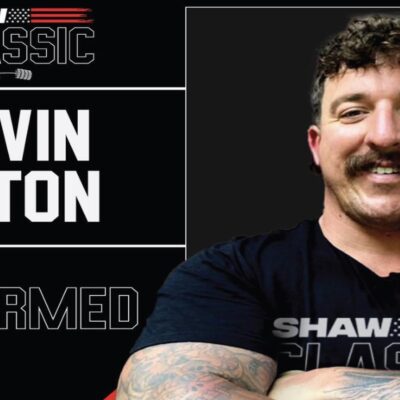Everyone has the ability to tell a compelling life story, but very few are better at peeling back the layers of the sports world’s most complex characters than filmmaker and storyteller Gotham Chopra.
The noted documentarian has been able to spend time with a Who’s Who list of athletic icons—from Kobe Bryant, Olympian Simone Biles, Russell Westbrook, and Tom Brady—and has created timeless biographies out of endless hours of time-consuming footage breakdown. Oftentimes the results are a revealing look at a sports subject the public doesn’t oftentimes see in SportsCenter sound bites.
Chopra’s most recent effort, three years of documenting the life and tribulations of UFC superstar Conor McGregor may have been one of the most challenging endeavors. In his four-part Netflix documentary “McGregor Forever,” Chopra and his team shadowed the former UFC champion during one of the flamboyant fighter’s most trying times: preparing for three fights in 12 months in 2021, not to mention right in the middle of a global pandemic.
While fight fans globally have found reasons to love and hate McGregor, Chopra, who directed and was co-executive producer for the series, was able to get a behind the scenes snapshot of why the Irishman remains a driving force in the UFC. He was also able to establish a relationship with McGregor, showing a softer side that’s opposite of the fighter’s “Notorious” reputation that most fans are used to observing.
One of those moments caught by Chopra occurred following McGregor’s loss at UFC 229 to unbeaten (and now retired) Khabib Nurmagomedov, an Octagon showdown that was escalated following the infamous incident in which McGregor flung a chair at the champion’s bus after a press conference at Brooklyn’s Barclays Center. (McGregor pleaded guilty to disorderly conduct, and was ordered to five days of community service, including cleaning up a Brooklyn church.)
“There’s a vulnerability. You know, there’s a real human being inside that crazy showman, you know?” explains Chopra, who was able to capture footage of McGregor’s community service. “And there’s somebody thoughtful, and somebody who has also grown up in the fight game.”
Following the fight, in which Nurmagomedov submitted McGregor in the fourth round, a brawl between both camps ensued. While normal reaction would be to expect McGregor to have a part in this, Gotham Chopra was able to reveal where the beaten ex champion’s emotions really were at that moment.
“It was typical Conor McGregor UFC type of chaos,” Chopra says. “He’s in the dressing room, he gets dragged out, he’s in the dressing room, the locker room, Dana [White] comes in. And Dana’s asking him though crazy stuff that was going on. Conor couldn’t be bothered. He’s like, I lost. That’s the only thing that matters.”
Telling the sometimes complicated stories of some of the sports world’s finest has been Gotham Chopra’s calling, which began, he says, with the late Kobe Bryant for the 2015 Showtime series “Muse.” Today, his passion has morphed into Religion of Sports, a company he founded and partnered with a pair of high-profile stars—Brady and Michael Strahan.
Throughout his time working with some of the greatest in the sports world, Chopra has learned one key Winning Strategy shared by every athlete: Work hard, then keep working more. And although he’s far from ever being fight-ready, Chopra draws a slight similarity to McGregor, he says. Even with the fame and fortune, the love of fighting and competition remains in McGregor’s soul. For Chopra, he’ll leave the number-crunching to his team, he has more stories to tell.
“We’re storytellers at heart,” Gotham Chopra says. “And it just keeps on evolving. I have partners who have plans and financial goals and stuff like that, and that’s great. I’m not going to compare myself to Conor McGregor, but I’m in this moment. This is like my fight.”
Gotham Chopra’s Winning Strategy
1. Gotham Chopra Discovered that G.O.A.T.S Will Never Stop Looking to Improve
Athletes who I’ve worked with—from Tom Brady, Russell Westbrook, Conor McGregor—they do the work. They’re all gifted and amazing and super talented and all that stuff, but they don’t compromise. Like Connor, if he says he’s gonna have a sparring session for two hours today, prepare to be there for four or six hours.
He reminds me a lot of Steph Curry. You know, Steph and Conor couldn’t be more opposite in terms of personality: Connor is bombastic and wild, and Steph is quiet, kind, warm. But they’re both exactly the same. Here, you’re talking about Steph Curry, the greatest shooter in the history of the game, and yet he’s constantly obsessing over how to get better, like, how can he make tweaks to become a better shooter.
Then there’s Conor McGregor, arguably one of the best fighters on the planet. He’ll watch his footage, and look for little things like, “How can I do that better?” “How can I grapple better?” “How can I box better?” He’s looking for tiny little things that you and I would never notice in a million years, yet he see something and is like, “Let’s go back into the Octagon and try this.”
Tom Brady was the same when it came to his throwing motion. He’s the greatest quarterback in history. He’s made every throw over the course of 20 years. And yet, you would be with him during the offseason, and he’s like, “I think if I can improve my shoulder placement or my elbow, I think I can do this better.” When you’re talking this level of athlete, it’s an obsession.
2. You Can Be Both Genuine and Unique
The difference with Conor is that his personality is very singular. Mixed martial arts is not a team sport, it’s a singular thing—and that fascinates me. The fight game is is different than everything else—at the end of the day, two fighters get into a [cage] and one of them walks out the winner. It’s primordial and violent, but there are those people willing to do it over and over again.
You look at all the fighters, and then you’ve got this guy who is a showman with an incredible personality. And from what I’ve observed—like a lot of people over the years—Conor’s like a walking circus—there’s always energy, chaos and a spectacle around him.
But then as I started to get to know him and spend a little bit of time with him, you find out he’s a real human being. He’s a father. And more than anything else his real gift is what I call his presence. When you’re with him, he’s with you. It’s what he does.
In fighting you don’t just walk into the octagon and be distracted or you’ll get wrecked, literally. He’s kind of the same way. You know there’s gonna be all this stuff going on, but then it’s, OK, we’re gonna sit down and do an interview for 20 minutes. And he’s locked in. He’s paying attention. He’s smart, articulate, honest, and he’s really good at it.
It wasn’t always easy—he’s hard to wrangle because there’s so much going on. But when you get him, he’s as great as anyone.
3. For Gotham Chopra, It’s Root for the Player, But Hope for the Story
In my industry you build relationships, and [throughout the filming] I found myself rooting for Conor—I wanted him to win all those fights. At the same time nobody wished for a global pandemic to happen,
But this is Storytelling 101: tension.
If everything was great all the time, and everyone was winning, it’s great, but it’s not great for storytelling. But because of these sorts of right turns, it demands creativity, like how will I respond to this. And he had to. It’s one of Conor’s great gifts, picking himself off the mat, figuratively and literally. He’s the most resilient person I’ve ever been around. While everyone else in the world would obsess over the losses and the disappointments, he doesn’t.
He’s disappointed, obviously, you know, and you feel it in some of those moments after the fight, but he’s like the mad scientist who’s like, “Okay, how do I pick myself up? How do I how do I learn from this? What am I going to do better?” And that’s sort of inspiring. We all deal with disappointments because things don’t always go according to plan. And some people just, you know, wallow in it and are never able to get past it. And then there are others who are like, “Okay, got it. Let me let me figure this out. I’ll be back.” That’s Conor—to an extreme level.
I’m not really close with Conor, but I remember working with Tom Brady, who I am close with— and I grew up a huge Patriots fan. So when I worked with him in 2017, when the Patriots went to the Super Bowl against the Eagles, I certainly wanted him to win. But then I realized in the aftermath, although it was hugely disappointing [the Eagles defeated the Patriots, 41-33, in Super Bowl LII], it was kind of amazing because now it’s better for a story when you lose. I said that to Tom—he wasn’t thrilled, but he got it.
As a storyteller, you don’t wish for the worst, especially what happened to Conor in his third fight against Dustin Poirier. But if you’ve seen the series, you’re in that hospital within 24 hours, It’s an opening scene of the whole series of him in the hospital, within hours of him breaking his ankle. That is a powerful scene, that only exists because of what happened in real life. Again, no one rooted for that, but as a storyteller, you’re like, WOW, this may be the strongest thing we have. We’re going to open with this.
4. An Adversary Can Be Good for Business (and Great for Your Story)
I think [Conor and the UFC] are symbiotic. They coexist. I don’t want to say need each other— Conor is incredibly accomplished, he has fame, fortune, his legacy is in tact as a fighter. In life, he’s made a lot of money so he can go on and do other things, but he loves fighting. And the UFC is the biggest fight institution on the planet, so it’s the right stage for him.
Meanwhile, the UFC has certainly become a behemoth as a major sports industry, especially after buying the UFC.
I don’t know if the UFC needs anyone, but Conor continues to be one of the most iconic, popular, certainly a showman unlike anyone else in the fight game. So they certainly benefit from having him be a part of it.
So maybe it’s not neither of them need each other, but both of them reap the continued success of being together. There’s this sort of public perception of like tension and everything, but even through this we saw, like, Dana White and Conor are both really smart business people. And I think really, genuinely, you know, good people, like with, but like, you know, they’re smart and they get in a room and they figure it out. They both see the bigger picture and I don’t neither of them really hold grudges. I think they’ll they’ll figure it they’ll continue to figure it out.
5. Your Story will Rarely Stay on Script
There was one key ingredient to all the athletes’ success: They do the work. They show up and put in the hours. [For aspiring filmmakers and documentarians], when it comes to storytelling or all that. It’s like, do your work. Do your research Do your research. Even read “Hero of 1000 Faces”—you know, the hero’s journey, the art of storytelling. You know, there’s a whole tie-ins to it.
This isn’t about being inspired all the time. It’s Storybuilding 101: There’s subjects, tension, conflict. Those are the basic elements and you have to put in the work. The good news is like now we have the tools—everybody’s got a camera in their pocket. And there’s platforms we can get it out there, but still, to be the best you got to put in the work and time.
A piece of advice I got once was, it’s not always gonna go according to plan. We call it unscripted television. I don’t call it a reality program, because it’s not reality. It’s story building. So be resilient, figure out how to adapt to the situation. How do you pick yourself up.
One thing I can guarantee in this business—in my experience anyway—is that you’ll build the outline, and then sooner or later, life is going to deviate from the outline. And now you have to be willing to be agile and adapt. Also choose carefully who you have around you, who’s on your team. I get a lot of the credit, but it’s the team behind me on these projects, the cinematographer, the producer, the editor, the writers, the researchers. Not only do they have to be talented, they have to be good people who are willing to get in there and work with you when things [aren’t perfect].
And how do you know when the story is over? You don’t. When we started this project, Conor had one child, now he has three kids. A lot has gone on, personally and professionally for him. There’s certainly a lot more story to be told in his life, but for us, it felt like we’re at a moment where we can take a breath for a split second. Let’s use this as a “stopping point.”





